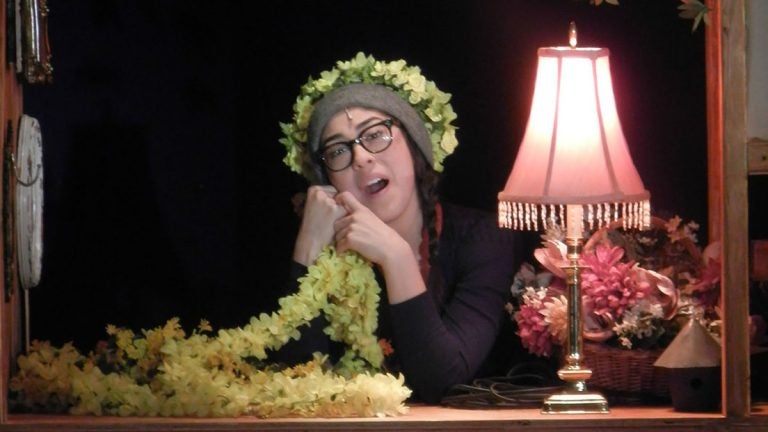Among Philly theater’s Barrymore winners, a wide swath of stage companies
Listen
Leigha Kato, as Rapunzel, sings in her tower in Theatre Horizon's production of 'Into the Woods.' The show won the Barrymore Award for best production of a musical during the last theater season.
The Barrymore Awards, celebrating the region’s professional theater, have been top-heavy with accolades to established, big-budget, big-audience theaters — until now. This year, smaller professional theaters in and out of Center City are shining in the spotlights.
Theater Horizon in Norristown and Theatre Exile, which produces mostly in South Philadelphia, took home awards Monday night for the best musical and drama productions, respectively, of the last theater season. The mid-size InterAct Theatre produced the best-new-play winner, one among an entire season of world premieres InterAct tackled. The steam-gathering Philadelphia Artists Collective, innovative 11th Hour Theatre Company, and Flashpoint — a small company that now produces only during the summer — all produced work that won awards for their performers or designers.
The best work, a diverse display
The 20th Barrymore Awards ceremony at the Merriam Theater was arguably the most inclusive, celebrating a diversity of stages that make theater a growth industry in the region, although one heavily supported by private and corporate philanthropy. The awards weren’t planned to show the diversity of stages here — judges did what they’re always charged to do: Vote for the work they believed was the best.
The results are a clear signal that mid-sized and small theaters among the 34 companies currently competing for Barrymore Awards have pushed their own bars higher. Many of the smaller ones have now been operating for a decade or more and have built a base of loyal fans. Others have yet to reach 10 years, and continue to produce strong work and attract money from individuals and foundations.
The Barrymore Awards are the way Philadelphia’s theater community celebrates its accomplishments in a glittery night out with lots of cheering and good feeling. Monday’s show featured an original opening number, performances of pieces from best-musical nominees, a memorial tribute and accompaniment by a five-piece band. Off to stage-right, the entire ceremony was delivered in American Sign Language.
The awards, overseen by the umbrella group Theatre Philadelphia, are themselves expanding. At the end of the ceremony, attended Monday night by about 750 theater artists and supporters, Theatre Philadelphia director Joel Sumner announced a new annual award beginning next year for an outstanding theater education program run by the region’s stage companies — the many programs here attract people of almost every age. The $7,500 award is sponsored by the Victory Foundation.
Its creation means that money awarded to winners and runners-up in four Barrymore categories will total more than $75,000. In the 23 other categories, winners receive trophies.
Once again this year, the awards were skewed because two theater companies chose not to participate. One, the Walnut Street Theatre, by far the largest in audience and budgets and the oldest continuously operating theater in the nation, has been in and out of the awards over the years. The other, Media Theatre, is a producer of musicals in Delaware County.
The winners
Theatre Horizon in Norristown received four awards Monday night, all for its production of “Into the Woods,” the musical by Stephen Sondheim and James Lapine that mashes together several folk tales and normally plays as a large-scale show. Director Matthew Decker whittled the usual razzmatazz from his production to make it work on Theatre Horizon’s stage — smaller than that of large downtown houses. The result was magnetic, a sellout with a razor-sharp focus on the story and a dozen Barrymore nominations. Monday night, the show was named best musical production, Decker won as best director of a musical, the cast of 10 won for outstanding ensemble in a musical, and Amanda Morton won for directing the show’s music.
Theatre Exile, a mid-size company that attracts audiences for its productions of cutting-edge work, won the most Barrymores on Monday — five. All but one were for its tense production of “The Whale,” Samuel D. Hunter’s dark portrait of a grotesque 600-pound man bent on self-destruction. The play was developed here under the aegis of PlayPenn, a locally based incubator of new work.
“The Whale” won for best production of a play, and Matt Pfeiffer won for best direction of a play. The busy local actor Scott Greer, who currently plays Frank Rizzo in an Exile production, won for his portrayal — he appeared on stage almost the entire time in an enormous fat suit, and frequently with a death-rattling wheeze. Christopher Colucci won for his sound design of the play.
Exile’s remaining award went to Catharine Slusar for her seething portrayal of a theatrical icon: Martha, in a production of “Who’s Afraid of Virginia Woolf?” from Theatre Exile. It was Slusar’s first Barrymore for a performance after six nominations; she’d won an emerging-artist Barrymore 14 years ago.
For the second year in a row, the same two performers won as best actor and best actress in a musical. Ben Dibble took home a Barrymore for eight roles he gamely played in “Herringbone,” produced by Flashpoint Theatre. Liz Filios gave a wrenching performance as the obsessive and controlling Fosca in Arden Theatre Company’s production of Sondheim’s rarely done “Passion.”
The Barrymore for best new play went to Christopher Chen, whose nimble and intentionally baffling “Caught” — about lying, fact, fiction, trust and what we choose to believe — was produced by InterAct Theatre. InterAct won this year’s $25,000 Virginia Brown Martin Philadelphia Award, presented to a production that demonstrates the ability of theatre to illuminate community issues and interactions, for “The Dangerous House of Pretty Mbane.”
InterAct commissioned the play from Jen Silverman, who wrote a richly-layered drama about South Africa’s condoning of “correctional rape” — homophobic sexual assault against lesbians, and sometimes gay men, to punish them or to “convert” them to heterosexuality. Akeem Davis, a member of the play’s cast, won the $15,000 award for an emerging theater artist — an award funded by Carole Haas Gravagno to honor her late husband, F. Otto Haas. The cash award Davis received supports its winners’ living expenses to encourage them to remain in the Philadelphia theater community.
Dan Hodge took home a supporting-actor medallion for playing the low-class Roughman in the play “The Fair Maid of the West,” from Philadelphia Artists’ Collective, a group started a few years ago by already-successful local artists who wanted to stage work not normally produced. The Collective also captured the $10,000 award for an evolving theater company, an award started three years ago by arts supporters June and Steve Wolfson for a developing company whose budget is under $400,000. (For the record, I am a judge on the committee for the Wolfson Award.)
A newcomer to the theater community, Campbell O’Hare, won best supporting actress in a play for her portrayal of a street-smart college kid in Wilma Theater’s production of the wickedly funny “Rapture, Blister, Burn.” Set designer Kristen Robinson also took home an award for that show.
Best supporting actress and actor in a musical were Leah Walton and Michael Philip O’Brien, both in the 11th Hour Theatre Company world premiere of “Field Hockey Hot,” a looney spoof on high-school sports by local composer Michael Ogborn.
Marla Jurglanis’ costumes and Samantha Reading’s choreography won them Barrymores for “Bach at Leipzig,” produced by People’s Light & Theatre Company in Malvern. For his mood-setting lighting in Philadelphia Theatre Company’s “brownsville song,” Russell H. Champa took home an award, as did the locally-based band ILL DOOTS for their original music on Flashpoint’s “Hands Up: 6 Playwrights, 6 Testaments.”
The nine-member cast of “Little Rock,” about the black students who integrated Central High there in 1957, won for the best ensemble in a play. “Little Rock” was produced by Passage Theatre, a professional company in Trenton that qualifies as Barrymore-eligible.
Lifetime achievement
This year’s lifetime achievement award went to the longtime Philadelphia actor, director and retired University of the Arts professor Johnnie Hobbs Jr., associated for four decades with Freedom Theatre and a longtime fixture on numerous stages around the region. Most recently, he appeared in 1812 Productions’ “The Shoplifters,” a comedy that opened during the Fringe Festival and featured Hobbs as a put-upon but pragmatic supermarket security officer.
Hobbs, 66, is a native Philadelphian who went to Edison High School and originally wanted a career playing baseball. He was drafted into the Army and sent to Germany, where he learned to arm and disarm nuclear weapons. Hobbs returned to Philadelphia in 1971 and enrolled in classes at Freedom Theater, acted and began teaching there, and met his wife there — Patricia Scott Hobbs, who directs and choreographs, and runs the training program at Freedom Theater. She introduced her husband, along with actress Drucie McDaniel, Monday night.
McDaniel told the Barrymore audience that Hobbs, who began teaching at the University of the Arts in 1983, “instills in his students a sense of what he calls citizen artistry — understanding what it means to be a citizen and an artist and that you are responsible for so much.”
In his acceptance speech, Hobbs said he was grateful for many opportunities in theater over the decades. “My goals have always been to be a team player and a good scene partner. I find myself in the position to continue to achieve in this life I have chosen — to tell stories and to illuminate and explore the human condition.”
Behind the scenes
An all-volunteer team of Barrymore nominators saw 105 shows to declare whether they were eligible for nominations and in which categories. Among the 60 nominators — theater artists, academics and some critics — teams of eight were randomly assigned to see each eligible production. They forwarded their recommendations to a panel of 12 judges who met periodically and eventually narrowed the choices down to a maximum of seven nominees in play categories, four in musical categories.
The same 12 judges then used a weighted scoring system to vote their choices for first, second and so on in each category. The nominee with the highest score in each category is the winner.
To qualify for the awards, a theater company must pay its cast and crew minimums of $150 a week for actors, $500 a show for designers and $750 a show for directors. Larger companies eligible for Barrymore Awards hold higher-level contracts with Actors’ Equity, the national union of actors and stage managers, which requires more than those minimum scales.
At the end of the ceremony Monday night, attendees walked down Broad Street to an after-party at the University of the Arts’ Dorrance Hamilton Hall.
The full listing of winners follows.
2015 Barrymore Awards for Excellence in Theatre(To read a NewsWorks review of a production, click on the title of any play or musical in blue.)
Outstanding Overall Production of a Musical“Into the Woods,” Theatre Horizon
Outstanding Overall Production of a Play “The Whale,” Theatre Exile
Outstanding Direction of a Play Matt Pfeiffer for “The Whale,” Theatre Exile
Outstanding Direction of a Musical Matthew Decker for “Into the Woods,” Theatre Horizon
Outstanding Leading Actor in a Play Scott Greer in “The Whale,” Theatre Exile
Outstanding Leading Actress in a Play Catharine Slusar in “Who’s Afraid of Virginia Woolf?”, Theatre Exile
Outstanding Leading Actor in a Musical Ben Dibble in “Herringbone,” Flashpoint Theatre Company
Outstanding Leading Actress in a Musical Liz Filios in “Passion,” Arden Theatre Company
Outstanding Supporting Actor in a Play Dan Hodge in “The Fair Maid of the West,” Philadelphia Artists’ Collective
Outstanding Supporting Actress in a Play Campbell O’Hare in “Rapture, Blister, Burn,” Wilma Theater
Outstanding Supporting Actor in a Musical Michael Philip O’Brien in “Field Hockey Hot,” 11th Hour Theatre Company
Outstanding Supporting Actress in a Musical Leah Walton in “Field Hockey Hot,” 11th Hour Theatre Company
Outstanding Set Design Kristen Robinson for “Rapture, Blister, Burn,” Wilma Theater
Outstanding Costume Design Marla Jurglanis for “Bach at Leipzig,” People’s Light and Theatre Company
Outstanding Lighting Design Russell H. Champa for “brownsville song (b-side for tray),” Philadelphia Theatre Company
Clear Sound Award for Outstanding Sound Design Christopher Colucci for “The Whale,” Theatre Exile
Outstanding Original Music ILL DOOTS for “Hands UP: 6 Playwrights, 6 Testaments,” Flashpoint Theatre Company
Outstanding Choreography/Movement Samantha Reading for “Bach at Leipzig,” People’s Light and Theatre Company
Outstanding Music Direction Amanda Morton for “Into the Woods,” Theatre Horizon
Outstanding Ensemble in a Play “Little Rock,” Passage Theatre Company
Outstanding Ensemble in a Musical “Into the Woods,” Theatre Horizon
Independence Foundation Award for Outstanding New Play “Caught” by Christopher Chen, InterAct Theatre Company
F. Otto Haas Award for an Emerging Philadelphia Theatre Artist Akeem Davis
Virginia Brown Martin Philadelphia Award (for understanding issues and communities) “The Dangerous House of Pretty Mbane,” InterAct Theatre Company
June and Steve Wolfson Award for an Evolving Theatre Company Philadelphia Artists’ Collective
Lifetime Achievement Award Johnnie Hobbs Jr., actor director, teacher
WHYY is your source for fact-based, in-depth journalism and information. As a nonprofit organization, we rely on financial support from readers like you. Please give today.




